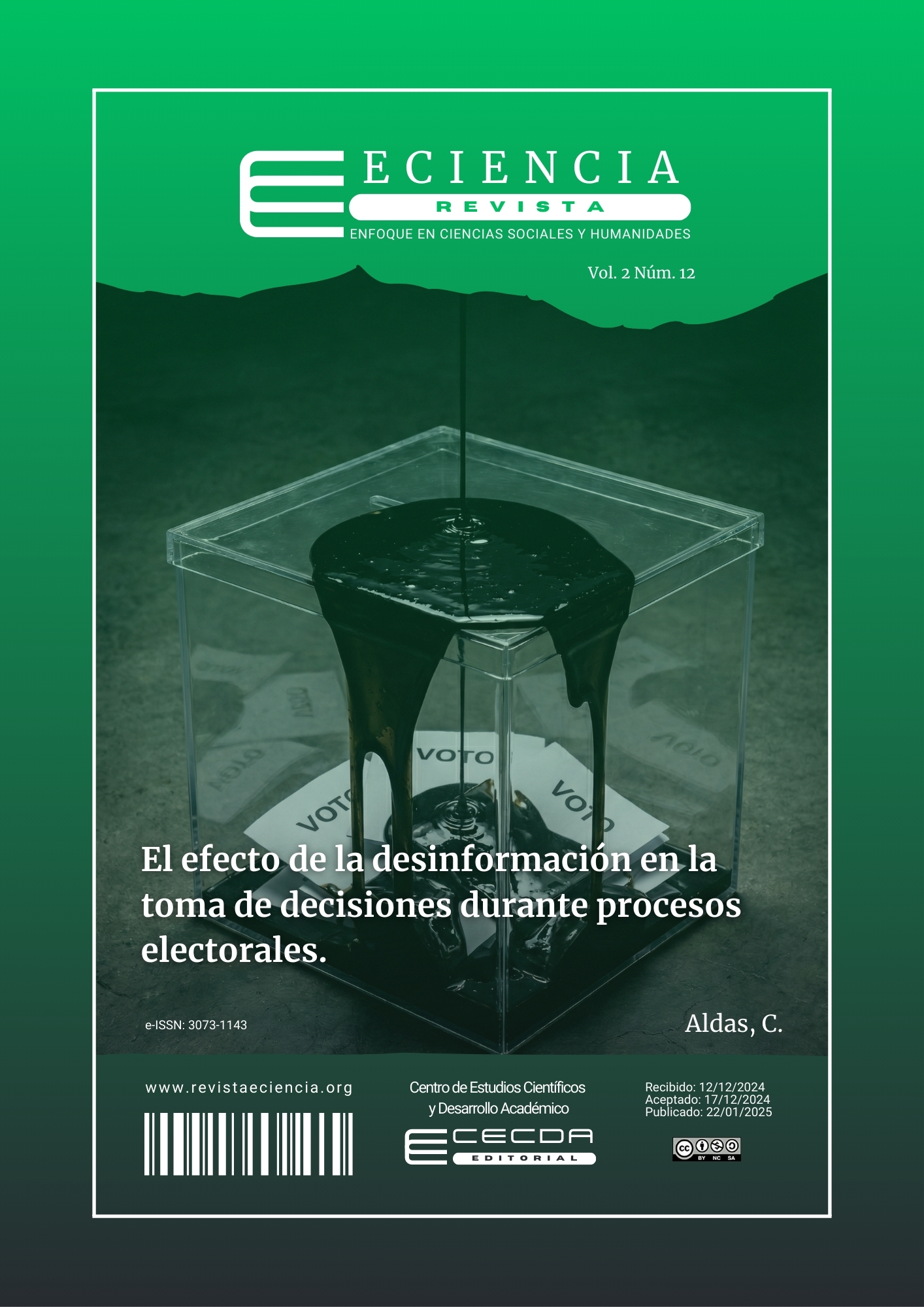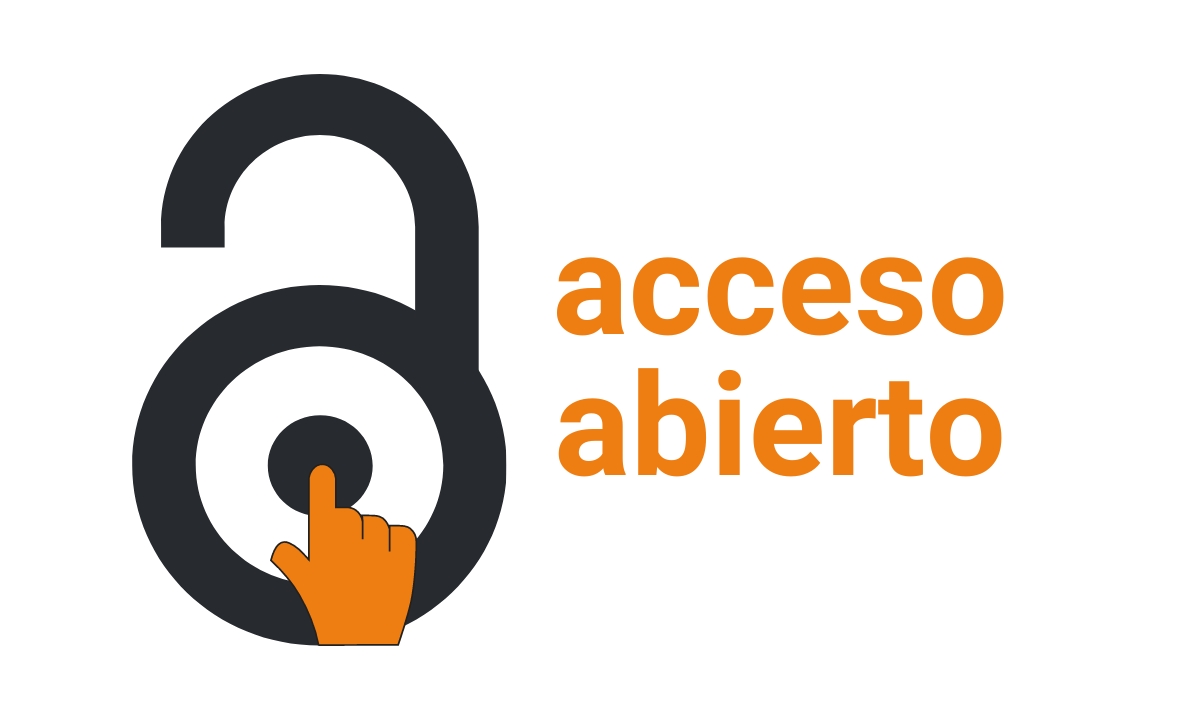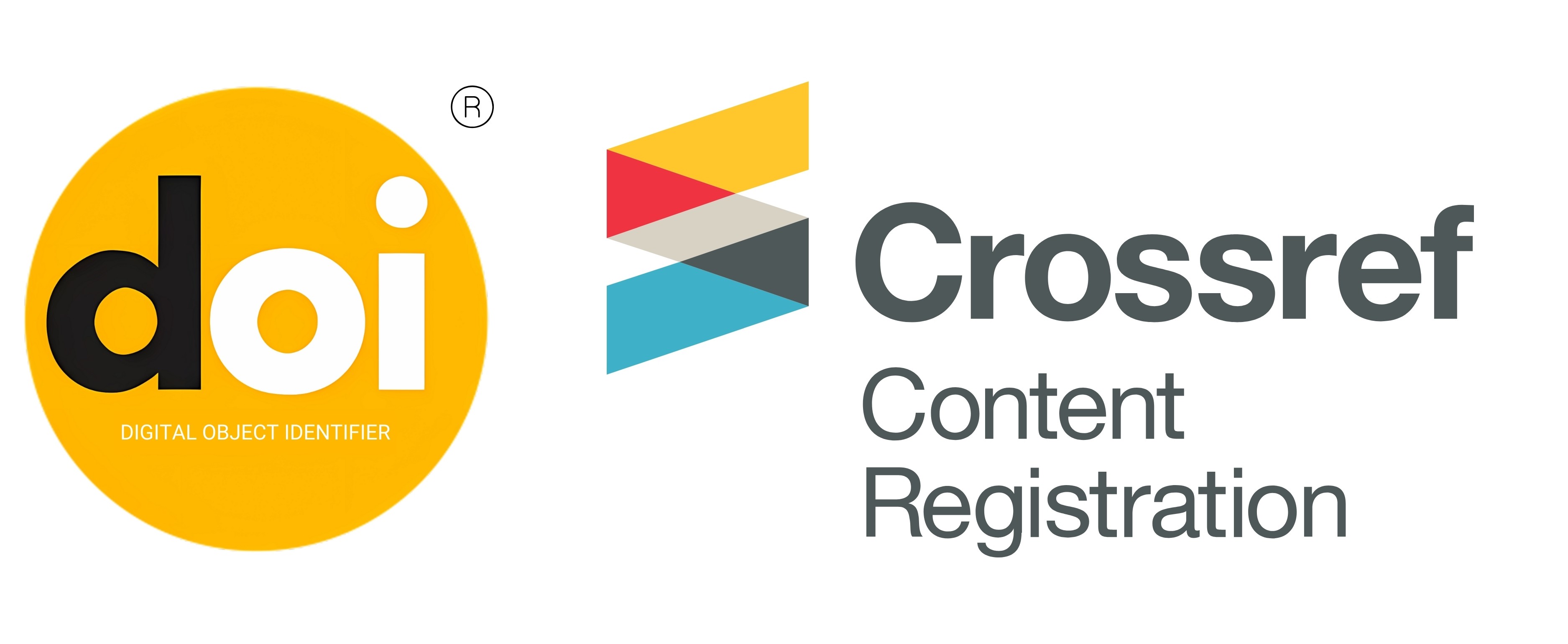El efecto de la desinformación en la toma de decisiones durante procesos electorales.
DOI:
https://doi.org/10.71022/7vrhwt16Palabras clave:
alfabetización mediática, desinformación, intención de voto, noticias falsas, procesos electoralesResumen
Este estudio analizó la influencia de la desinformación en la percepción y decisiones electorales, así como el papel de la alfabetización mediática en su mitigación. Con un enfoque cuantitativo y diseño transversal correlacional, se aplicó un cuestionario a 384 ciudadanos. Se utilizaron estadísticas descriptivas e inferenciales, como correlaciones de Spearman y tablas cruzadas. Los hallazgos indican que la exposición a desinformación afecta la percepción sobre candidatos y el proceso electoral, aunque no siempre cambia la intención de voto. La alfabetización mediática disminuye la susceptibilidad a noticias falsas, pero su impacto es limitado. Se concluye que es clave fortalecer la educación digital y establecer regulaciones más efectivas para reducir la desinformación en los procesos democráticos.
Descargas
Referencias
Bennett, W. L., y Livingston, S. (2018). The disinformation order: Disruptive communication and the decline of democratic institutions. European Journal of Communication, 33(2), 122–139. https://doi.org/10.1177/0267323118760317
Bradshaw, S., y Howard, P. (2019). The Global Disinformation Order: 2019 Global Inventory of Organised Social Media Manipulation. Copyright, Fair Use, Scholarly Communication, etc. https://digitalcommons.unl.edu/scholcom/207
Carrasco, L. V., Naranjo, M. M., Naranjo, P. M., y Ortiz, W. X. C. (2025). Construcción de la Opinión Pública en un contexto de desinformación y polarización previo a las Elecciones Generales 2025 de Ecuador. Polo del Conocimiento, 10(1), Article 1. https://doi.org/10.23857/pc.v10i1.8798
Darioshi, R., y Lahav, E. (2021). The impact of technology on the human decision-making process. Human Behavior and Emerging Technologies, 3(3), 391–400. https://doi.org/10.1002/hbe2.257
Ecker, U. K. H., Lewandowsky, S., Cook, J., Schmid, P., Fazio, L. K., Brashier, N., Kendeou, P., Vraga, E. K., y Amazeen, M. A. (2022). The psychological drivers of misinformation belief and its resistance to correction. Nature Reviews Psychology, 1(1), 13–29. https://doi.org/10.1038/s44159-021-00006-y
Ferrara, E. (2022). Twitter Spam and False Accounts Prevalence, Detection and Characterization: A Survey. First Monday. https://doi.org/10.5210/fm.v27i12.12872
Festinger, L. (1957). A theory of cognitive dissonance (pp. xi, 291). Stanford University Press.
Graves, L. (2018). Understanding the promise and limits of automated fact-checking. Reuters Institute for the Study of Journalism. https://doi.org/10.60625/RISJ-NQNX-BG89
Guess, A. M., Nyhan, B., y Reifler, J. (2020). Exposure to untrustworthy websites in the 2016 US election. Nature Human Behaviour, 4(5), 472–480. https://doi.org/10.1038/s41562-020-0833-x
INEC. (2022). Proyección poblacional a nivel cantonal periodo 2020—2025.
Juárez, J., y Celecia, C. (2023). (Des)Legitimar al árbitro: Narrativas de desinformación sobre el INE en YouTube durante la elección México 2021. Global Media Journal México, 20(39), Article 39. https://doi.org/10.29105/gmjmx20.39-502
Judge, E. F., y Korhani, A. M. (2020). Disinformation, Digital Information Equality, and Electoral Integrity. Election Law Journal: Rules, Politics, and Policy, 19(2), 240–261. https://doi.org/10.1089/elj.2019.0566
Krzywoń, A. (2021). Summary Judicial Proceedings as a Measure for Electoral Disinformation: Defining the European Standard. German Law Journal, 22(4), 673–688. https://doi.org/10.1017/glj.2021.23
Lazer, D. M. J., Baum, M. A., Benkler, Y., Berinsky, A. J., Greenhill, K. M., Menczer, F., Metzger, M. J., Nyhan, B., Pennycook, G., Rothschild, D., Schudson, M., Sloman, S. A., Sunstein, C. R., Thorson, E. A., Watts, D. J., y Zittrain, J. L. (2018). The science of fake news. Science, 359(6380), 1094–1096. https://doi.org/10.1126/science.aao2998
Lotero, G., Romero, L. M., y Pérez, M. A. (2018). Fact-checking vs. Fake news: Periodismo de confirmación como componente de la competencia mediática contra la desinformación. Index.comunicación: Revista científica en el ámbito de la Comunicación Aplicada, 8(2), 295–316.
Nyhan, B., y Reifler, J. (2010). When corrections fail: The persistence of political misperceptions. Political Behavior, 32(2), 303–330. https://doi.org/10.1007/s11109-010-9112-2
Persily, N. (2017). The 2016 U.S. Election: Can Democracy Survive the Internet? Journal of Democracy. https://www.journalofdemocracy.org/articles/the-2016-u-s-election-can-democracy-survive-the-internet/
Salazar, G. (2024). Votar en tiempos de desinformación: Nuevos patrones informativos y comportamiento electoral. Estudios sociológicos, 42. https://doi.org/10.24201/es.2024v42.e2538
Simon, H. (1982). Models of Bounded Rationality: Behavioral Economics and Business Organization. (MIT Press, Cambridge, MA., Vol. 2). https://www.scirp.org/reference/referencespapers?referenceid=2055170
Sivalo, D. (2024). An analysis of the role of disinformation in elections. African Journal of Inclusive Societies, 4, 50–62. https://doi.org/10.59186/SI.HY74FJ87
Tandoc Jr., E. C., Lim, Z. W., y Ling, R. (2018). Defining “Fake News”: A typology of scholarly definitions. Digital Journalism, 6(2), 137–153. https://doi.org/10.1080/21670811.2017.1360143
Tkemaladze, J. (2024). The Concept of Data-Driven Automated Governance. Georgian Scientists, 6(4), Article 4. https://doi.org/10.52340/gs.2024.06.04.38
Tucker, J. A., Guess, A., Barbera, P., Vaccari, C., Siegel, A., Sanovich, S., Stukal, D., y Nyhan, B. (2018). Social Media, Political Polarization, and Political Disinformation: A Review of the Scientific Literature (SSRN Scholarly Paper No. 3144139). Social Science Research Network. https://doi.org/10.2139/ssrn.3144139
Vosoughi, S., Roy, D., y Aral, S. (2018). The spread of true and false news online. Science, 359(6380), 1146–1151. https://doi.org/10.1126/science.aap9559

Descargas
Publicado
Declaración de disponibilidad de datos
No se han publicado los datos. Puede solicitarlos al autor a través del correo electrónico de contacto.
Número
Sección
Licencia
Derechos de autor 2025 ECiencia

Esta obra está bajo una licencia internacional Creative Commons Atribución-NoComercial-CompartirIgual 4.0.
Todos los contenidos se distribuyen bajo una licencia de uso y distribución Atribución/Reconocimiento-NoComercial-CompartirIgual 4.0 Internacional (CC BY-NC-SA 4.0).











